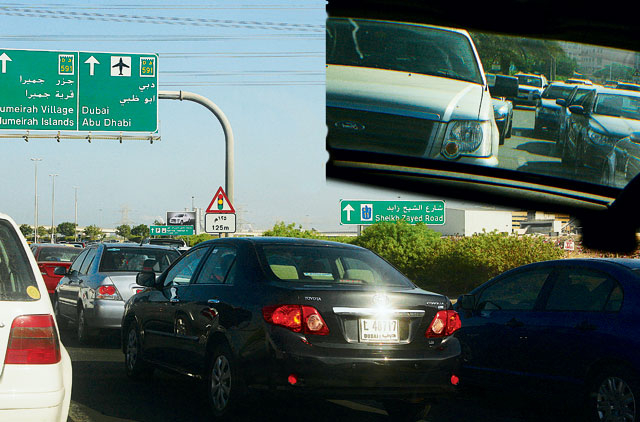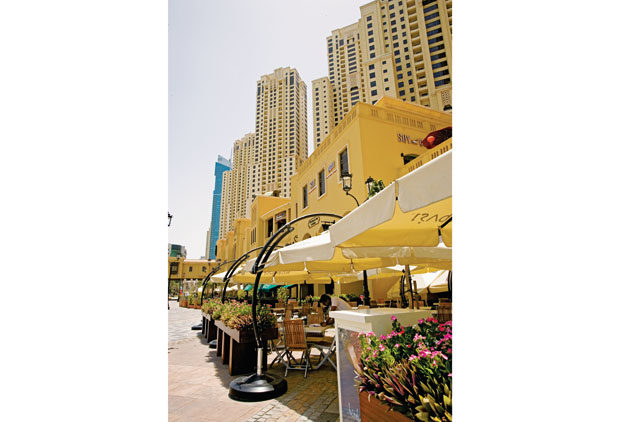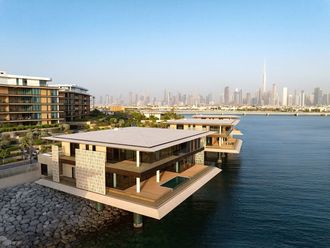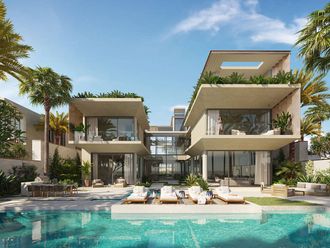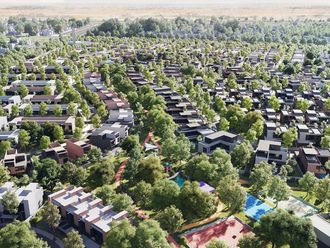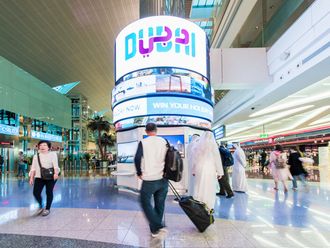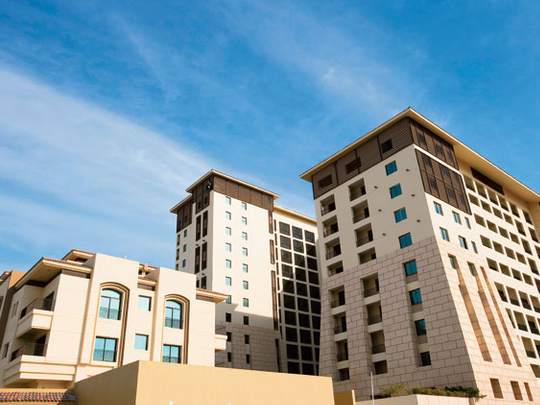
Arif Usman's family loves the expansive landscaping, play areas and the community camaraderie in Discovery Gardens. Appalled at having to shell out Dh140,000 for a sub-standard two-bedroom apartment in Mussaffah in Abu Dhabi during the heady days of the property boom, Usman moved to this leafy residential enclave on Dubai's fringes, willing to risk the daily commute for a reasonably priced, quality abode. He represents thousands of other Abu Dhabi professionals who took haven in Dubai's cheaper home options.
But with new capacity coming online in Abu Dhabi, a change in attitude is becoming increasingly apparent, which means that Abu Dhabi is regaining acceptance from professionals such as Usman. "With Abu Dhabi creating a lot of jobs, peak hour traffic on the highway is severe now and the commute is rendered risky. I am now looking to relocate to off-island communities in Abu Dhabi such as Khalifa City, Mohammad Bin Zayed City or even Mussaffah which offer new apartments at competitive rentals. Though not comparable with Dubai, Abu Dhabi is catching up with retail facilities and good road networks to the main island. My family will miss the community bonhomie here, but generally speaking, the standard of maintenance has declined in Discovery Gardens," Arif observes.
Off-island communities
Given the complex relationship between the two real estate markets, stakeholders have been closely observing the secondary market stirrings and tenant enquiries for units in off-island communities such as Al Bandar, Khalifa City, Al Raha Gardens, Mohammad Bin Zayed City and Al Reef. While most Abu Dhabi professionals opt for the commute after being priced out of the capital's prohibitively expensive rental market, the decision is also linked to construction quality, lifestyle offerings and easy access to schools, hospitals and other amenities in Dubai. With the average rents for one- and two-bedroom apartments in Abu Dhabi still 45 per cent more expensive than Dubai, most feel the commute is a small price to pay.
"The threshold rental differential/premium that most tenants would be prepared to pay for the same standard of housing in Abu Dhabi to avoid the daily commute to Dubai would be no more than 10 to 15 per cent," explains Paul Maisfield, general manager and head of professional services, Asteco, Abu Dhabi.
While it is widely believed that the quality of apartments at Al Raha Beach and Al Reem Island will equal that of product offerings available in Dubai Marina and Jumeirah Beach Residence (JBR), it will, however, take some time before these developments transform into full-fledged communities.
"The Dubai Marina and JBR are not only popular because of their functional product attributes; they are renowned for being sought-after destinations that offer an excellent dynamic lifestyle. The mix of diverse retail and community facilities that these two projects offer are among the top reasons that attract tenants and buyers to these projects," suggests Mohanad Alwadiya, managing director, Harbor Real Estate.
Phased completion
Among the new communities that have been delivered, Al Bandar is the most high-end so far, offering marinas, shops, cafes and a restaurant. The opening of Abu Dhabi's biggest shopping centre, Dalma Mall, in Mussaffah will add to the lure of communities in its catchment area.
"The first phases of these projects are just completing, with a good mix of facilities and connectivity. Naturally, as further phases come onstream, larger parts of the infrastructure will link together, for example the waterways and water taxis of Al Raha Beach. Much the same happened in Dubai Marina which was built on a phased basis. Plus, many are questioning the balance of lifestyle with a gruelling commute thrown in," contends Andrew Covill, head of investment sales, LLJ Property. The creation of these new residential clusters is also attracting demand and tenant migration from poor quality accommodation in mainland Abu Dhabi. The ‘flight to quality' is likely to drive up vacancy rates and reduce rents for unrealistically priced units on the island. "City centre residents living in poor quality units are always on the look-out for new property, either on or off the island; most families would like to upgrade into villas or more spacious modern apartments," Loshini Lawrence, operations manager, Better Homes, Abu Dhabi, points out.
With property off the main island tending to be more spacious in comparison to cramped units in mainland Abu Dhabi, real estate agents expect the number of client enquiries to increase significantly once the precincts get closer to completion. This could even drive landlords on the main island to refurbish old buildings, become more flexible about pricing and payment terms and consider investing in better maintenance and property management solutions.
While the presence of international schools, good nightlife, a variety of restaurants and a cosmopolitan crowd are factors that tilt the scales in Dubai's favour, it enjoys the advantage of opening its real estate market four years before Abu Dhabi did.
Playing catch up, the Abu Dhabi Government too is investing significant resources to improve infrastructure across numerous sectors, including education, health, transport and tourism. While there are some communities on Abu Dhabi mainland that match the lifestyle convenience of Dubai, such properties are limited and priced two to three times higher than their counterparts in Dubai.
On a more optimistic note, Andrea Menown, leasing manager, LLJ Property, says, "Those commuters who have made the move have seen dramatic changes in Abu Dhabi in terms of social activities. They also see the immediate benefits in the quality of their life by no longer having to make the tiresome and hazardous commute."
Dubai's declining rents
While market parity between the two emirates is some way off, the swelling of residential inventory in Dubai and the bottoming out of prices are likely to sustain the influx of Abu Dhabi residents and widen the rental variance. There has also been a noticeable trend of commuters reluctant to move back to Abu Dhabi for fear of compromising lifestyle options.
"Dubai's current value proposition is its much reduced prices, while Abu Dhabi's appeal lies in its new developments and financing. This forms a complementary relationship, as those with tight budgets will go to Dubai while those looking for higher quality will stay in Abu Dhabi," says Masood Al Awar, CEO of Tasweek.
This continued exodus is likely to put sustained pressure on Abu Dhabi landlords. "They must lock tenants into contracts with attractive benefits such as efficient maintenance, multiple rent payments, competitive rates, completed interiors [cupboards in bedrooms, appliances in kitchens, landscaped gardens, and so on]," suggests Lawrence of Better Homes.
Though market observers eschew predicting a rental levelling-off between the two cities, many believe a drop of 15-20 per cent would see a more dramatic uptake for Abu Dhabi units among commuters. "I don't think the prices in Abu Dhabi will ever decline to the level of prices in Dubai. The property market in Abu Dhabi is benefiting from a favourable demand and supply equation. The new supply that is emerging daily in Abu Dhabi will push prices down as there is room for a slight, but definitely not major, correction in pricing. For commuters to move back to the capital, a few variables must also be realised, including ample supply of quality properties, reasonable prices, enhanced property management and a diverse F&B and specialty retail mix, coupled with quality facilities and amenities," Alwadiya reckons.
The Tasweek CEO further suggests that the projects being undertaken between Abu Dhabi and Dubai could see some level of price convergence, although this would depend on completion dates. Despite being as different as chalk and cheese in the supply-demand equation, the two emirates are bound together by certain common challenges, viz liquidity constraints, developers' cash flow concerns, falling rents and falling yields. Another common factor across all asset types within the markets is that both are moving in favour of tenants. While LLJ Property claims to have received an increased number of enquiries from commuters seeking apartment living in Abu Dhabi, other real estate agencies did not record any evidence suggesting a reversal in trends of professionals looking to ditch the Dubai commute.


